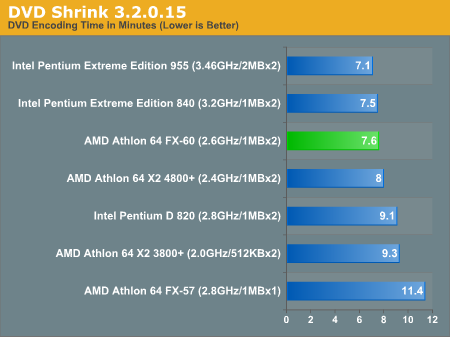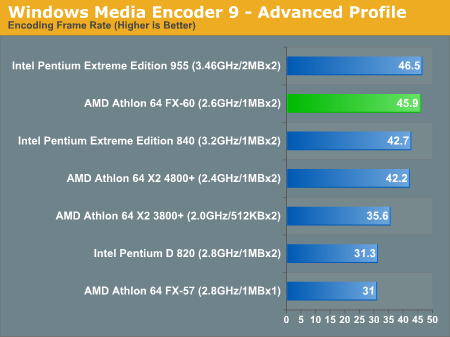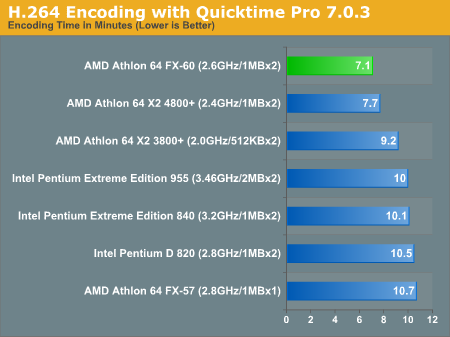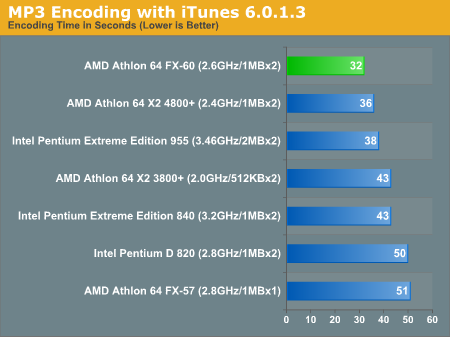AMD Athlon 64 FX-60: A Dual-Core farewell to Socket-939
by Anand Lal Shimpi on January 9, 2006 11:59 PM EST- Posted in
- CPUs
Media Encoding Performance using DVD Shrink, WME9, Quicktime and iTunes
First up is DVD Shrink 3.2.0.15. Our test was simple - we took a copy of Star Wars Episode VI and ripped the full DVD to the hard drive without compression, effectively giving us an exact copy of the disc on the hard drive. Then, using the copy of the DVD on the hard drive (to eliminate any DVD drive bottlenecks), we performed a DVD shrink operation to shrink the movie to fit on a single 4.5GB DVD disc. All of the options were left on their defaults, so the test ends up being pretty easy to run and reproduce. The scores reported are DVD encoding times in minutes, with lower numbers meaning better performance.
The DVD Shrink test is quite important as DVD Shrink is quite possibly one of the easiest tools to rip a DVD. The easier a tool is to use, the more likely it's going to be used, and arguably the more important performance using it happens to be.
Moving on, we have our Windows Media Encoder 9 test, which uses the advanced profile settings for video encoding. We left all settings at their defaults and just proceeded with a MPEG-2 to WMV-HD conversion. The values reported are in frames per second, with higher numbers being better.
Next up, we have Quicktime Pro 7.0.3 and we perform a MPEG-2 to H.264 encoding task. All of the settings are left at their defaults, with the exception that we optimize the output file for download with a 256kbps data rate while leaving the resolution untouched. We also adjust the video options to optimize for the best quality. We report the transcoding time in minutes, with lower values being better.
Finally, we have a MP3 encoding test using iTunes 6.0.1.3. For this test, we simply took a 304MB wav file and converted it to a 192kbps MP3 file, measuring the encode time in seconds. The only iTunes option that we changed was to prevent the playback of the song while encoding.
First up is DVD Shrink 3.2.0.15. Our test was simple - we took a copy of Star Wars Episode VI and ripped the full DVD to the hard drive without compression, effectively giving us an exact copy of the disc on the hard drive. Then, using the copy of the DVD on the hard drive (to eliminate any DVD drive bottlenecks), we performed a DVD shrink operation to shrink the movie to fit on a single 4.5GB DVD disc. All of the options were left on their defaults, so the test ends up being pretty easy to run and reproduce. The scores reported are DVD encoding times in minutes, with lower numbers meaning better performance.
The DVD Shrink test is quite important as DVD Shrink is quite possibly one of the easiest tools to rip a DVD. The easier a tool is to use, the more likely it's going to be used, and arguably the more important performance using it happens to be.

Moving on, we have our Windows Media Encoder 9 test, which uses the advanced profile settings for video encoding. We left all settings at their defaults and just proceeded with a MPEG-2 to WMV-HD conversion. The values reported are in frames per second, with higher numbers being better.

Next up, we have Quicktime Pro 7.0.3 and we perform a MPEG-2 to H.264 encoding task. All of the settings are left at their defaults, with the exception that we optimize the output file for download with a 256kbps data rate while leaving the resolution untouched. We also adjust the video options to optimize for the best quality. We report the transcoding time in minutes, with lower values being better.

Finally, we have a MP3 encoding test using iTunes 6.0.1.3. For this test, we simply took a 304MB wav file and converted it to a 192kbps MP3 file, measuring the encode time in seconds. The only iTunes option that we changed was to prevent the playback of the song while encoding.

3D Rendering Performance using 3dsmax 7
Gaming Performance using Battlefield 2, Call of Duty 2 and Quake 4










94 Comments
View All Comments
LupusQA - Tuesday, January 10, 2006 - link
I just don't see the point in spending $1000+ plus for a CPU like this. My Opteron 165 has the same amount of cache, and is currently running stable at 2.7Ghz. Not to mention it only cost me $300.The only use this chip would have is for bragging rights to show off how much cash you have, or for those who wouldn't think of straying into the area of overclocking. Guess thats why AMD cancelled the 939 Opterons.. :p
SynthDude2001 - Tuesday, January 10, 2006 - link
I feel the exact same way. I've got a $356 Opteron 170, runs as fast as 2.75GHz. I'm glad overclocking is still alive and well, easy way to save $800. ;-)Furen - Tuesday, January 10, 2006 - link
Lots of X2s and Opterons can hit 2.7GHz without a problem but most people dont overclock. Sure buying this CPU wont give you the best bang for the buck but what high-end part does? The reason why AMD is against regular people buying Opterons instead of X2s is not because people are buying them to overclock them but because a) the supply of these is pretty limited as it is, b) some people will buy these things throw them onto a regular socket 939 motherboard AND expect support, and c) it messes up the market segmentation and will make it hard to gauge whether or not going socket 939 helped the 100 series with its intended market. People who overclock lowend CPUs are not the ones that would buy the higher-end CPUs even if the lower-end ones didnt overclock so well so I'd be hardpressed to call it a loss of revenue for AMD.lsman - Tuesday, January 10, 2006 - link
?a) supply is not our issue... asks AMD and mostly their pricing policy
b) Opteron 939 can't work on regular 939 mobo? huh?
c) again, that's AMD policy/decision to go Opteron 939, as well as their pricing policy. Ask them. (I personally think they shot themselves in the foot with such pricing structure. May as well cut price on those X2...)
And, no ppl bought low-end to OC move up to high end? I once won't spend over $60 for a CPU and now spend over $150 and eyeing on those $300+.
Furen - Tuesday, January 10, 2006 - link
One last thing: You are eyeing a $300 dollar CPU (a dual-core, I'd guess) because there's nothing that's cheaper with the same features. Before we could buy full-featured Athlon XPs for 60-70 bucks but now you'd be hard-pressed to find one below $150. If you think about it, however, you're still looking at the "low-end" CPUs in each feature set, which is why AMD refuses to drop the prices on A64s below ~$150 and X2s below ~$300, because people will buy these anyway. Regardless, I meant that most of us (yes, I normally buy the lowend stuff for myself) would not buy a $1000 CPU if the $300 X2 did not reach 2.6-2.7GHz, hell, most of us would not even look at a 4400+ or a 4600+.Furen - Tuesday, January 10, 2006 - link
I said that AMD doesnt want people to use Opterons as desktop chips, not that we dont want to use them.a) Supply is AMD's concern but I'd hardly think that they could go much higher on the price. Remember that Socket 940 Opteron 100s were actually quite a bit cheaper than current socket 939 Opteron 100s, they got a price hike but raising the price too much would have resulted in no one using them.
b) I didnt say that they would not work, I just said that their use on "unapproved" motherboards would mean that the chip would be unsupported (as in technical support) and unwarranted by AMD.
c) Most Opterons ended up having quite a big price increase when AMD went to socket 939. When AMD released its S939 Opteron it also lowered the price of A64s. In the end the Price of A64s and their equivalent Opterons ended up being something like the average of AMD's Old Opteron Price and AMD's Old A64 price. The market normally opposes price increases unless there is a shortage which is probably why AMD did not try to saturate the market these chips. Having more chips than the predicted demand would have just led to having idle inventories which would have forced them to drop the price on these even further. The problem was that there was a very big demand increase (which AMD should have forseen but didn't, then again, it could have just been that AMD wanted to have a shortage in order to make people accept the price hikes) so the few units out there were immediately snapped up by consumers.
Viditor - Tuesday, January 10, 2006 - link
The previous announcements from AMD were that they would continue with socket 939 till at least 2007, though the first release chips were going to be AM2. Are you sure that they are really stopping all 939 chips immediately??
Cheers
Anand Lal Shimpi - Tuesday, January 10, 2006 - link
According to the roadmaps I've seen, Socket-939 will continue but it will top out at FX-60. So while they will still make Socket-939 processors, the fastest you'll be able to get will be the dual core 2.6GHz FX-60.Take care,
Anand
ohnnyj - Tuesday, January 10, 2006 - link
Uh oh, does that mean my faithful CPU is going to jump out of my computer and move to Florida :).ohnnyj - Tuesday, January 10, 2006 - link
Oops, this was suppose to go under the post about the FX-55's retirement above. Sorry.